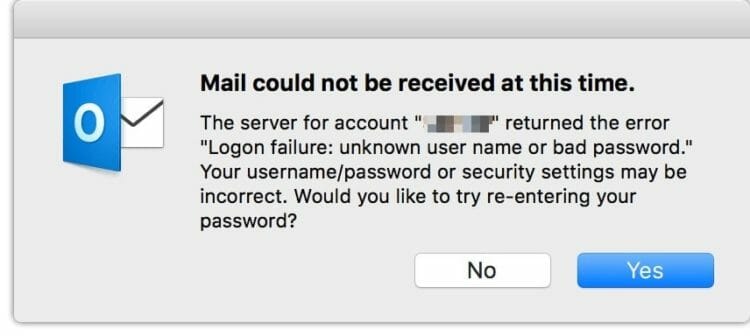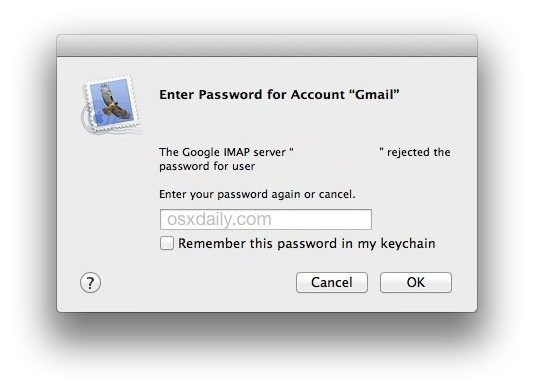

- YAHOO MAIL ON MAC KEEPS ASKING FOR PASSWORD HOW TO
- YAHOO MAIL ON MAC KEEPS ASKING FOR PASSWORD PASSWORD
Since then, certificate-issuing and -tracking procedures and the way browsers check for legitimately issued documents have substantially reduced but not eliminated that particular risk.īecause of phishing risks, Apple has chosen to protect some data that it views as highly secure or very private with end-to-end encryption that prevents Apple from knowing anything about the contents of the synced data. Some visitors to Google sites were phished in this way on multiple occasions several years ago.
YAHOO MAIL ON MAC KEEPS ASKING FOR PASSWORD PASSWORD
The attacker could then simply use your login name and password to initiate an attempt to log in to iCloud, even triggering Apple to send you an extra login token used for two-factor authentication, which, if you entered it on the phishing site, could be used by the attacker at iCloud.Īpple users have been phished, of course, although as far as I know, Apple has never suffered from a fraudulent certificate attack. There are many kinds of phishing attacks, one severe type of which involves obtaining fraudulently issued HTTPS certificates that can have all the trappings of a legitimate and secure site. Phishing requires only that an attacker fools someone into thinking they are entering their credentials into a legitimate site that is, instead, a man-in-the-middle. This data could also be at risk in a successful phishing attack. It’s extremely unlikely, but it’s not strictly impossible. In very rare circumstances, someone who compromised Apple’s keys or server security could extract that -accessible information from a transmission or from iCloud. For that subset, Apple maintains the encryption keys that protect the data when it’s at rest, and it could turn over that data if forced to by law enforcement.Īpple discloses which data is stored with encryption keys it possesses. Some of it is available in decrypted form if you were to access it via.
iCloud Stores Two Kinds of Secured Data for YouĪll the data that’s synced between your devices via iCloud is encrypted while in transit (generally using HTTPS) and at rest on Apple’s servers. But it’s not sufficiently detailed-that would require screens of text-to explain what’s going on. The short answer is that this prompt is actually Apple working to protect your security, and the explanation is accurate.

Now I’ve figured out what is going on by reviewing Apple’s documentation and deducing the missing pieces. While I had heard of this prompt happening once last year, I had never seen it myself. (It has a new, shorter title in this release, and is already updated for iOS 13.1-check it out if you’re looking for more information about iOS networking, privacy, and security.) I encountered this issue, as did Take Control publisher Joe Kissell, in preparing the iOS 13 and iPadOS 13 revision to my long-running networking and security book, Connect and Secure Your iPhone and iPad. I had to take a photo of this unusual login screen, as it was during setup and screen capture wasn’t available.ĭoesn’t this seem contradictory, confusing, and just plain wrong? Why would Apple ask for the password or passcode for one of your other devices? Could it be some sort of scam? What exactly is going on here? Your password is encrypted and cannot be read by Apple.” The prompt might instead ask for your iPhone or iPad passcode. This password protects your Apple ID, saved passwords, and other data stored in iCloud. Enter the password you use to unlock the Mac ‘ name here’. The message reads something like, “Enter Mac Password. If you’ve set up or restored an Apple device recently and have two-factor authentication enabled on your Apple ID, you may have seen a message during configuration that defies your understanding of how Apple maintains device privacy and account security. Why Apple Asks for Your Passcode or Password with a New Login (and Why It’s Safe)

#1597: Apple Watch fitness tracking, cloud storage issues, Roku Express 4K+, watchOS 8.4.1.#1598: OS updates, Fantastical 3.6 self-scheduling, Mindfulness measures HRV, Monterey on too-old Macs, TidBITS list gremlins.#1599: Avoiding blue light from screens, Bowflex C6 Bike spin cycle, Internet mapping services, Apple Buying Advice website.
YAHOO MAIL ON MAC KEEPS ASKING FOR PASSWORD HOW TO


 0 kommentar(er)
0 kommentar(er)
